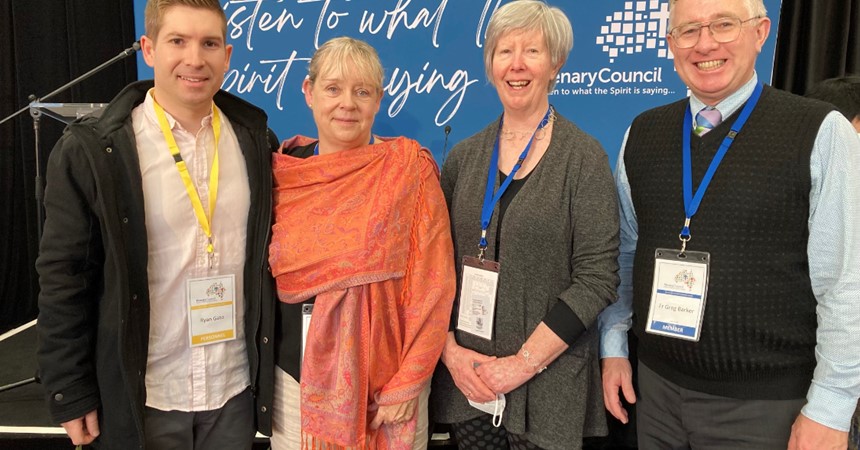“What the Plenary Council is all about is planning for the future of the Church in this country at a very complex time,” Archbishop Coleridge said at the time.
It was determined that the Fifth Plenary Council would have three phases: preparation, celebration and implementation. It is a process that spans several years to give the Catholic community time to listen, dialogue and discern with one another.
While the COVID-19 pandemic has caused some delays to the Fifth Plenary Council process, the Holy Spirit continues to guide its members. In July this year, the nine-month celebration phase of the Fifth Plenary Council ended. Council members approved a concluding statement, which reflected discernment that took place over six days.
The statement said the Fifth Plenary Council had been an “expression of the synodality that Pope Francis has identified as a key dimension of the Church’s life in the third millennium”.
Acknowledging that while some moments during the week had been “calm and harmonious”, and others were “tense and difficult”, the statement also said, “every moment has been blessed; the entire week has been grace-filled, though never a cheap grace”.
“The Holy Spirit has been both comforter and disrupter.”
Three Diocese of Maitland-Newcastle’s Council members attended the Second Assembly. Helen Belcher was one of those members and is also a member of the Diocesan Synod Working Party.
Ms Belcher said that while Part 4 motions regarding the equal dignity of women and men failed to pass, which resulted in a silent and spontaneous protest, it ultimately “produced better discernment and better decisions.”
“The Assembly could have descended into chaos. Instead, members opened themselves to respectful conversations and to the guidance of the Holy Spirit,” she said.
Fellow Diocese of Maitland-Newcastle council member, Bernadette Gibson said that she went into the Second Assembly of the Fifth Plenary Council concerned that the motions and proposals were a fete accompli.
“Initially unconvinced of the power or purpose of spiritual conversations, I exit a great fan of both the Holy Spirit and the process,” Ms Gibson said.
She said the anticipated decrees will confer more certainty for many of the Church’s already signposted directions, “like greater communion with our First Nations people, ecological conversation, formation and education” and added they will also “solidify the position and provide the building blocks for the next steps forward into a new way of living a Christ-centred Church.”
Ms Belcher and Ms Gibson believe the Second Assembly did not address all issues raised in the Listening and Dialogue phase of the plenary process and that not all the motions are perfect.
“The motion on the equal dignity of women and men highlighted that there is still a lot of work to be done, and not just in this area. We must do more to reach out to our LGBTIQQA+ brothers and sisters. Ignorance because of privilege can no longer be an excuse for any of the those we have left on the sidelines”, Ms Gibson said.
However, as the Church now begins the third and final phase of the plenary council process- implementation, they both remain hopeful.
“The Second Assembly of the Fifth Plenary Council gave me hope in the ability of the Church to genuinely behave synodally. I hope this lesson can be translated to all levels of the Church in the future,” Ms Gibson said.
Ms Belcher added that while the decrees are yet to be promulgated, she believes that as a local Church, we can embrace the outcomes as part of our Diocesan Synod process which is already underway.
“We can examine the decrees and motions and map what we are already doing and what we need still to do.”
And, she said that she will be taking inspiration from the Council celebration that occurred when guiding engagement in the Synod.
“The use of spiritual conversations as the means of addressing the motions was a highlight. Members were invited into a space where we could listen, dialogue and discern before casting our votes. I favour their adoption as our preferred way of engaging and working within the Diocese.”
After the November meeting of the Australian Catholic Bishops Conference, the decrees will be sent to the Holy See.
Once recognitio is received by the Holy See, the decrees will be implemented and become the law of the Church in Australian six months later and therefore formalise a refreshed approach to how we proclaim the Gospel.
Ms Gibson said that as a Church, we may be disappointed at times by the actions and views of some who oppose the new direction, but that we should take consolation from the power of the Holy Spirit.
“As the Church of Maitland-Newcastle, we need to step into this hope and applaud the decisions ratified in the Council as foundational,” Ms Gibson said. “It is time for all of us to stand up and be the Church in the way she has always desired us to be – the hands and heart of Christ.”























































































